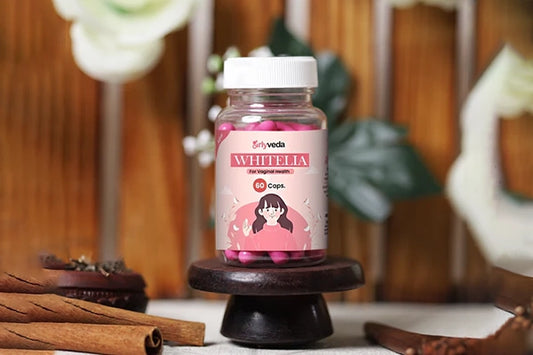Are PCOS and PCOD the Same? Understanding the Difference, Symptoms & Causes

If you’ve ever Googled, “Are PCOS and PCOD the same?” you’re not alone — and you’re definitely not the only one left scratching your head after reading conflicting information.
Some websites say they’re identical; others paint them as completely different problems. So, what's the real story?
Let’s break it down in simple words with no confusion.
What is PCOD? (Polycystic Ovarian Disease)
Imagine your ovaries working overtime and releasing lots of immature or partially developed eggs. These eggs don’t grow properly and form tiny cysts. That’s PCOD in a nutshell.
What Are the Common Symptoms of PCOD?
PCOD (Polycystic Ovarian Disease) can cause several changes in a woman's body. These signs can affect both physical appearance and emotional well-being. Let’s look at them in a simple way:
Irregular Periods
Periods that don’t come on time or skip for months? That’s one of the biggest signs of PCOD. Hormones in the body are not in balance, so the menstrual cycle becomes unpredictable.
Weight Gain
Suddenly gaining weight, especially around the stomach area, is common in PCOD. Even if you eat normally, your body might store fat differently.
Acne and Oily Skin
Those stubborn pimples on your face or back? PCOD can cause the skin to produce more oil, which blocks pores and leads to acne.
Mood Swings
Feeling low one moment and angry the next? Hormonal ups and downs in PCOD can lead to mood changes, irritation, and sadness for no clear reason.
Main Causes of PCOD: Let's Break It Down
Many daily habits and lifestyle choices play a role in triggering PCOD. Here's how:
Stressful Lifestyle
Working too much, overthinking, lack of relaxation – all of these build up stress. And stress can mess with your hormones, leading to PCOD symptoms.
Lack of Physical Activity
If you're sitting all day and not moving much, your body’s metabolism slows down. This makes it harder to burn fat and easier to develop hormone issues.
Unhealthy Diet
Eating too much junk food, fried snacks, sweets, and sugary drinks can disturb the hormone balance. These foods spike insulin levels, which is linked to PCOD.
Poor Sleep or Odd Work Routines
Sleeping too late, staying awake at night for work, or having no fixed schedule confuses your body’s natural rhythm. This affects hormone production and increases the chances of PCOD.
Good News?
Yes! PCOD is easily manageable with healthy habits and Ayurvedic treatments like herbal capsules. The condition doesn’t usually affect fertility in the long run if you stay consistent with your care.
What is PCOS? (Polycystic Ovary Syndrome)
Now, PCOS is a bit more serious.
It’s a metabolic and hormonal disorder that can mess with your ovulation — meaning your body may stop releasing eggs regularly. This affects your chances of getting pregnant and increases the risk of other health issues like diabetes, anxiety, and heart disease later on.
Ritika’s journey:
"My diagnosis with PCOS was a shock. I wasn’t even overweight, but I hadn’t had my period for 4 months. I felt tired all the time. The doctor explained that PCOS isn’t just about weight. I started Ayurvedic PCOS capsules and slowly made peace with a new lifestyle — yoga in the morning, salads in the evening. Now, I’ve got my cycle back, and my energy too."
What Are the Signs of PCOS?
PCOS (Polycystic Ovary Syndrome) can silently affect a woman's body from the inside out. Here are some common signs that may point to PCOS:
1. Missed or Very Irregular Periods
One of the biggest clues! If your periods are missing for months or come without a pattern, it may be due to PCOS. Hormones aren’t working in sync, so the menstrual cycle gets disturbed.
2. Infertility or Trouble Conceiving
Because ovulation becomes irregular or even stops, many women with PCOS may struggle to get pregnant. But with proper care and guidance, this can often be managed.
3. Facial Hair or Excess Body Hair
Due to an increase in male hormones (called androgens), you might notice thick hair growing on the chin, upper lip, chest, or back.
4. Severe Acne
Not just teenage pimples—PCOS-related acne can be stubborn, deep, and painful, especially on the jawline, cheeks, and back.
5. Unexplained Fatigue
Feeling tired all the time—even after a good night’s sleep? That drained feeling may be because your hormones are out of balance, affecting your energy levels.
What Causes PCOS? Let’s Break It Down
PCOS doesn’t have one single cause. It’s usually a mix of several factors:
Genetics (Family History)
If your mother, sister, or aunt has PCOS, there’s a higher chance you might have it too. It can run in families, passing from one generation to the next.
Insulin Resistance
When your body doesn’t use insulin well, sugar stays in your blood. This leads to higher insulin levels, which can cause the ovaries to produce more male hormones, disturbing ovulation.
Chronic Inflammation
Low-level inflammation in the body (which we often don’t feel) can trigger the ovaries to produce more androgens. This can lead to symptoms like acne and weight gain.
Hormonal Imbalance (Excess Androgens)
Women with PCOS often have higher levels of male hormones, known as androgens. This is what leads to irregular cycles, facial hair, and acne.
Key Differences Between PCOD and PCOS
|
Category |
PCOD |
PCOS |
|
Severity |
Less severe |
More severe and long-term |
|
Ovulation |
Delayed or irregular |
May completely stop |
|
Impact on fertility |
Usually no long-term effect |
Can lead to infertility |
|
Commonality |
Very common in young women |
Less common but increasing |
|
Management |
Managed with lifestyle changes and Ayurveda |
Requires long-term treatment, sometimes medical intervention |
|
Risk Factors |
Lower risk of serious complications |
Higher risk of diabetes, heart disease, anxiety |
Natural & Ayurvedic Treatment Options for PCOS/PCOD
When it comes to managing PCOS or PCOD, many women are turning to ancient Ayurvedic wisdom for healing—gently and naturally, without harsh side effects. Ayurveda focuses on treating the root cause, not just the symptoms.
Ayurvedic Capsules to the Rescue
Certain herbs have been used in Ayurveda for centuries to support women’s health. If you’re dealing with hormonal issues, look out for capsules that include these key ingredients:
- Ashoka – Known as the "friend of women," it helps in balancing estrogen levels.
- Shatavari – A powerful herb for hormone regulation and emotional well-being.
- Lodhra – Great for reducing acne and calming the skin.
- Gokshura – Supports healthy metabolism and improves reproductive health.
What Do These Herbs Actually Do?
These herbal blends aren’t magic—they’re science-backed and nature-driven. Here’s how they help:
- Balance your hormones naturally – No synthetic chemicals involved.
- Cleanse your body from within – They help flush out toxins and reduce internal inflammation.
- Regulate your menstrual cycle – Brings more predictability to your periods.
- Reduce acne and mood swings – Hormone harmony brings clearer skin and a calmer mind.
- Boost your metabolism – Helps in managing weight and energy levels.
Pro Tip: If you’re looking for long-term healing and want to avoid the side effects of allopathic medicines, go for Ayurvedic PCOS tablets. They take time—but they work from the inside out.
Lifestyle Changes That Truly Work
Along with herbal support, making small shifts in your daily routine can bring big results. Think of it as tuning your body to a better rhythm.
Move Your Body
You don’t have to hit the gym hard—20 to 30 minutes of activity like brisk walking, yoga, or dancing is enough to keep your body active and boost hormone health.
Eat Smart
Swap the sugar and white bread for something your body will love:
- Choose low-carb, high-fiber meals like veggies, whole grains, and legumes.
- Include good fats like nuts, seeds, and ghee in moderation.
- Drink herbal teas like spearmint or cinnamon to soothe hormones.
Cut the Cravings
Try reducing your intake of:
- Sugary foods (cakes, soft drinks, etc.)
- Fried and processed snacks
- Too much caffeine or energy drinks
These foods mess with your insulin and hormone levels, making PCOS symptoms worse.
Relax Your Mind
Your mind and hormones are deeply connected. Managing stress is key to balancing PCOS.
- Practice deep breathing or meditation for just 10 minutes a day.
- Try gentle yoga to calm your system and increase blood flow to your reproductive organs.
Respect Your Sleep
A consistent sleep cycle is underrated medicine. Aim for:
- 7 to 8 hours of quality sleep every night
- Going to bed and waking up at the same time daily—even on weekends
Healing from PCOS/PCOD is not about overnight fixes. It’s a beautiful journey of tuning into your body, nourishing it with the right foods, herbs, and habits. Ayurveda gives you that gentle, lasting support—without the fear of side effects.
When Will You See Results?
Everyone’s body is unique. Some women start seeing results in 3 months, others might take 6 months or more. What matters most is consistency — and patience.
If you're using Ayurvedic capsules, eating healthy, and moving your body, you will see a difference. No need to rush it.
What Do They Help With?
Here’s how these tablets can support your body:
Regular Periods
One of the first benefits women often notice is more timely and predictable periods. That’s because the herbs inside help regulate your hormones and boost ovulation.
Reduced Acne & Hair Fall
PCOS tablets help control excess androgens (male hormones), which means less facial hair, clearer skin, and less hair fall over time.
Better Mood & Energy
Say goodbye to constant mood swings and that heavy tired feeling! These capsules help improve energy levels and stabilize emotional ups and downs.
Weight Management
Many Ayurvedic formulas are also designed to boost your metabolism, making it easier to manage your weight alongside a healthy diet and lifestyle.
Improved Insulin Sensitivity
Some tablets help your body use insulin better, which can reduce cravings, balance blood sugar, and lower your risk of diabetes—a common PCOS concern.
Extra Bonus: Thyroid Support
Some PCOS Capsule go a step further and include herbs that support thyroid health, which is super important since thyroid imbalances often go hand-in-hand with PCOS.
Smart Tip: Always read the label or ask your doctor/nutritionist before starting any supplement—especially if you have thyroid issues, diabetes, or are on any medications.
Final Words
PCOS tablets don’t offer instant results, but with patience and consistency, they can bring your body back into natural balance. Pair them with a clean diet, daily movement, and stress care—and you'll be on your way to feeling lighter, brighter, and more in control.












Thoughts on "Are PCOS and PCOD the Same? Understanding the Difference, Symptoms & Causes"